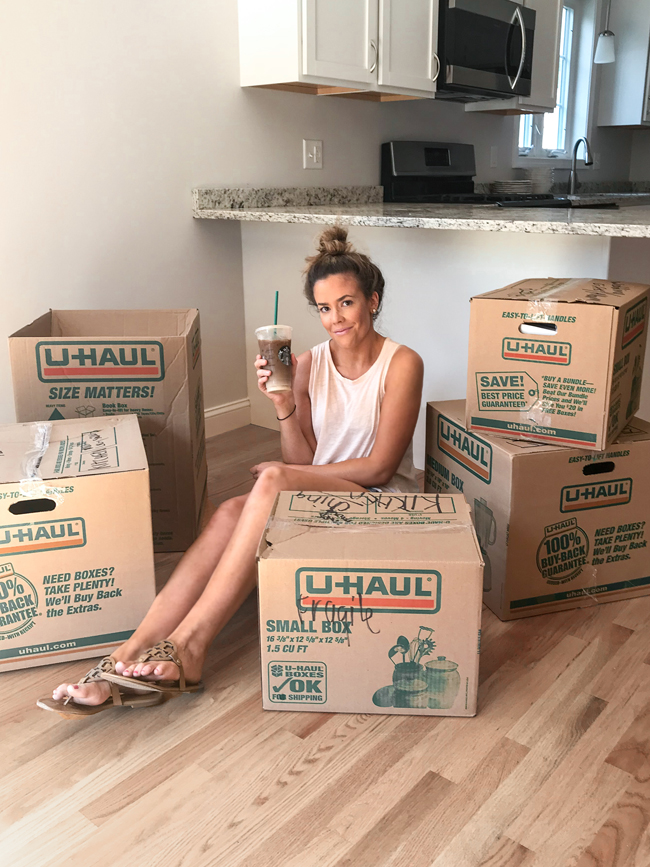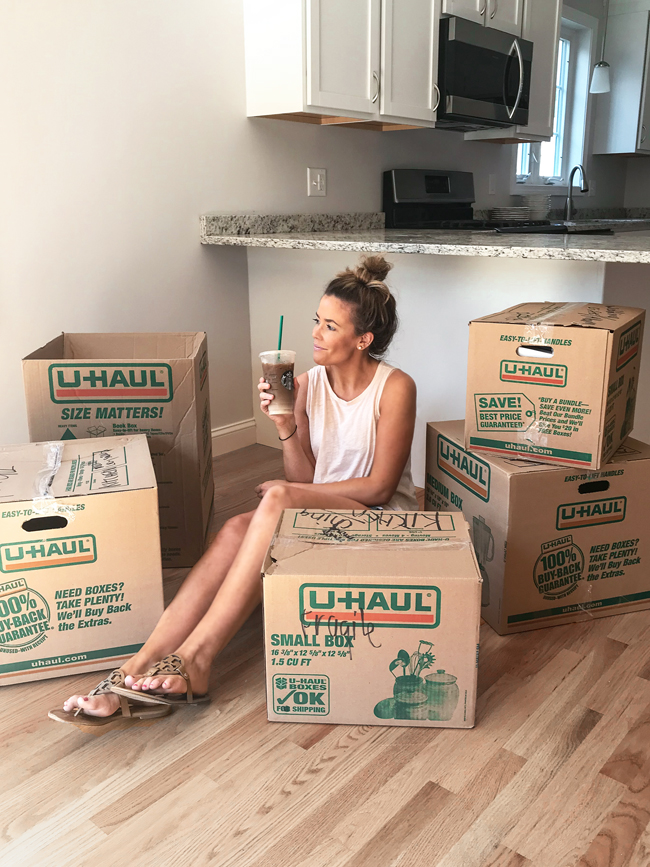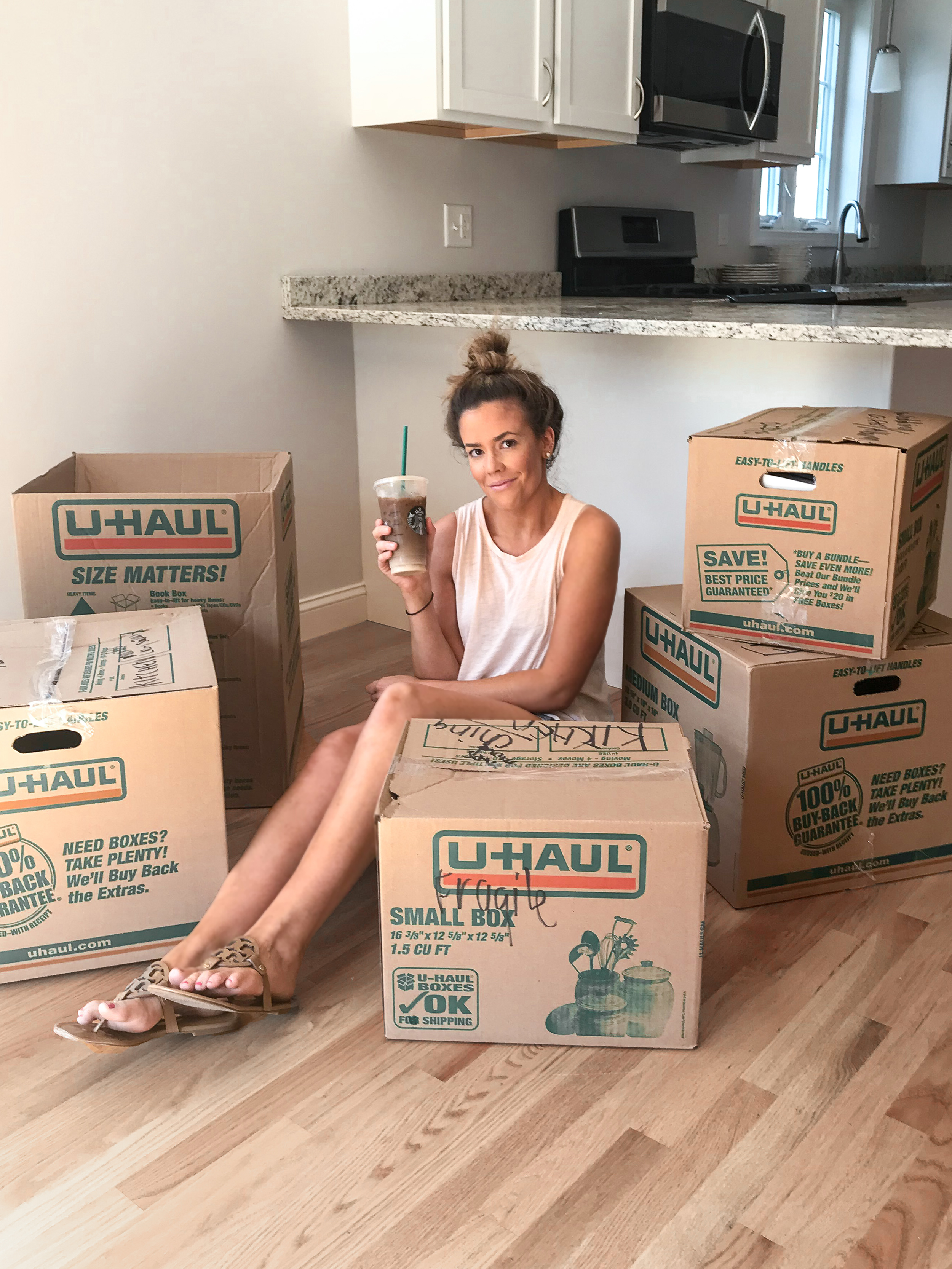Hi girlfran! Wow the feedback I’ve gotten from you on my Annual Reader Survey has been super eye opening and exciting. You still have time to take it if you haven’t already [two lucky girls will win $50 Starbucks giftcards Friday!].
One [of the many!] things I hear loud and clear – you want more advice content [finances, marriage, self care, wellness] and all things home related.
Comin’ right atcha! Today’s blog post ties in both actually.
Ever since sharing that S and I purchased our first home in August, I’ve been asked to share the process and any tips by SO.MANY.OF.YOU! I feel like many of us are experiencing the same life chapters together which is so fun 🙂
Rather than speak to the ins and outs of the house purchasing journey right off, I figured I’d take a step back and start with tips on PREPARING to buy a house. Because let’s be real – buying a house isn’t something that falls on the every day girl’s lap. It’s something you work hard for through saving, researching and preparing for months and years. S and I pulled together the five tips we’d give to our friends if they were thinking about buying a house.
Also – if you purchased a home please leave any tips you’d give a friend in the comments below so we can all ealrn from each other!
5 TIPS FOR PREPARING TO BUY A HOUSE

1.KNOW YOUR DEBT TO INCOME RATIO
Debt-to-income (DTI) ratio is the percentage of your income that goes toward paying your monthly debts. Your debt-to-income ratio is very important in the home buying process because it’s a key factor in helping lenders decide how much you can borrow.
Lenders calculate your debt-to-income ratio by dividing your monthly debt obligations by your pretax (AKA gross) income. Most lenders look for a ratio of 36% or less.
If your debt-to-income ratio is exceptionally high — like 50% or more — you should probably wait to make a home purchase and work towards making it healthier.
How can you create a healthy debt-to-income ratio?
- Avoid taking on more debt
- Don’t make large purchases on credit before you buy a home
- Pay off as much of your current debt as possible before you apply for a mortgage
If this is something you need to prioritize, don’t get overwhlemed! This process takes time. Make an action list of your to do’s and execute on month by month.
2. KNOW YOUR CREDIT SCORE
Having a healthy credit score is vital when buying a house. Your credit score is a number that represents the risk a lender takes when you borrow money. If you and your spouse will both be on the loan, both of your scores are equally weighed and important here. Good news? While it’s easier said than done, you can work to improve your credit score which I share below.
While many things are looked at by your potential lender under a microscope [DTI, savings, job history, pay stubs, etc], we were told that the credit score is weighed the heaviest. I mean it makes sense right? A good credit score means that you are more likely to pay the lender back than someone that has a bad credit score. [I mean this in the most basic, black and white rendition. I know a lot of crappy situations can happen to hurt your credit that aren’t in your control.]
Your credit score can not only effect if the lender decides to give you a loan, but it can also factor into how much of a down payment you must provide. If your credit score isn’t great, you are technically more of a risk and may be asked to put down more and finance less.
How can you create a great credit score?
- Avoid taking on additional debt
- Reconcile any outstanding debt with collection agencies
- Missed payments ding your score so at least make your minimum balance on debt payments like cell phone accounts, credit cards and student loan payments
- Refrain from applying for credit cards.. they ding your credit
*TIP* One thing S and I are very thankful our parents did when we were in high school and college was tying us to their credit cards. Both our parents had exceptional financial habits growing up, so tying us to their credit cards allowed for us to get ahead of the game in terms of credit for a few reasons, but especially because one factor of your credit score is your ‘credit age’.
So when recent grads are typically starting at the ground, S and I were able to graduate college with credit scores in the 800’s which is unheard of for people of many ages, especially 22 year olds.
Figured I’d mention it since that’s something we will be doing for our future children and you may want to too. At the time as 17 year olds, we just thought we had a card to use, but once we hit our mid twenties we were exceptionally grateful for the acts our parents did to cut us a break and help us get ahead!
3.UNDERSTAND YOUR LIVING EXPENSES
While the lender zeros in on your debts attached to your credit score – like credit card debt, student loans, and car loans – they don’t factor in other expenses we all have like groceries, gas, utilities, health insurance, clothing and more. Due to this, lenders can easily approve you to borrow much more than you’re actually comfortable paying for a monthly payment.
Take time to really get a grasp on your monthly expenses, which is a combo of your debt payments and living expenses. You can then subtract your monthly expenses from your monthly net income (post-tax) to understand your what money you have left over. This is where your mortgage will come from, but also keep in mind things like building a healthy savings account, money for furniture, renovation funds, emergency pet fund, building a 401K.
4. RESEARCH YOUR HOUSING MARKET
Understanding the market you’re in is key. You can get a feel for what houses are going for and back track into your potential mortgage.
In Massachusetts, the supply cannot meet the demand. With that, the market is very hot. Which means, houses sell fast, go into bidding wars and sell well beyond asking price at times. So that to say, understanding your housing market goes beyond the price tags of houses, but also reaction times and more.

5. SAVE, SAVE, SAVE
The more you put down, the less your monthly payment will be.
If you’re reading this while looking to prep for your first home, there are first-time home buyer’s programs that allow you to put down less. You can opt to put down anywhere from 2-5% instead of the common 20%. This is a great perk for many if you can take advantage of it! Just keep in mind, when you put down less than 20%, you’ll have also to pay a monthly private mortgage insurance (PMI) .. yet another monthly expense to factor in.
Leading up to buying a house, S and I chose to focuse on saving, saving, saving because we wanted to put down the largest chunk we could to have a lower monthly mortgage which in turn, reduces other expenses that come with putting a lower percentage down and our monthly mortgage payment. While that’s what we did, everyone’s situation is unique. Speak with your parents, mentors, anyone that has gone through this before, to learn from them and ultimately, make a decision that’s great for you nd your family.
*TIP* I debated on sharing this since it dives a tad more personal, but I figured it may help someone so I’m going to. Another very important thing we learned about the first time home buyer’s programs is that just because you’re a first time home buyer doesn’t mean you’ll qualify for the program. I figured that since we’re…. first time home buyers….. we’d be able to get a break and leverage some sort of program, but there is an income limit. So if you make over a certain amount, you can’t get the perk. We even tried just having one of us on the loan and that still wouldn’t work. I wanted to share this specfic experience because we are so happy we focused on saving rather than banking on a first time home buyer perk that people always throw around in conversations. So in hindsight, we are happy we planned years in advance to focus on saving for a down payment, rather than thinking we’d be able to put down less than 20%.
I hope this was helpful if you’re prepping to buy your fist home. Xo Mindy
If you already own a home, share your tips for preparing to buy a house below so that we can all learn from you!
SHOP MY HOME DECOR


WOW! Credit scores in the 800’s by 22?! That’s amazing! I’m so glad I found your post, I am trying to buy a house in about a year, so I’ve been trying to find tips on what to do now to make the process easier. Thank you for this!
THese are wonderful tips!
This hits home for me, my husband and I are trying to buy a house next year and there is just so much to know and get on top of! Thanks for sharing these tips girl! xo, Brittany Nicole | http://www.theblistblog.com
These are great tips for preparing for buying a house. I enjoyed reading your article. Thanks for sharing.
I want to buy a home in the next 3 years, and these tips will definitely come in handy as i prepare. thanks for sharing!
wOW THIS IS SUPER helpful! Thank you so much for the advice.
kasey ma
thestylewright.com
Great tips! I feel like i take a lot of this information for granted, and when it comes down to it, it’s all so important to know for certain!
Awesome house-buying tips! It can be so confusing with how much information and rules being thrown out there, especially when it comes to buying a house at a young age!
LOT’S OF GREAT TIPS HERE! MY HUSBAND AND I ARE LOOKING TO BUY A NEW HOUSE IN THE SPRING SO I’LL BE SURE TO SAVE THIS POST AND COME BACK TO IT! THANKS FOR SHARING!
wow! I am not even close to buying a house (just graduated last year) but these are such great tips and better than any of the research i have done for fun 🙂 would love to see more financial posts (i know some of that stuff can get kind of personal) but especially geared towards young professionals.
Thanks for awesime Tips!! Will be saving this for sUre! 👍